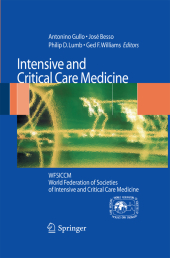 Neuerscheinungen 2014Stand: 2020-02-01 |
Schnellsuche
ISBN/Stichwort/Autor
|
Herderstraße 10
10625 Berlin
Tel.: 030 315 714 16
Fax 030 315 714 14
info@buchspektrum.de |

José Besso, Philip D. Lumb, Ged Williams
(Beteiligte)
Intensive and Critical Care Medicine
WFSICCM World Federation of Societies of Intensive and Critical Care Medicine
Herausgegeben von Besso, José; Lumb, Philip D.; Williams, Ged
2009. 2014. xxiii, 573 S. 150 Tabellen. 235 mm
Verlag/Jahr: SPRINGER, BERLIN; SPRINGER MILAN; SPRINGER 2014
ISBN: 8847056039 (8847056039)
Neue ISBN: 978-8847056039 (9788847056039)
Preis und Lieferzeit: Bitte klicken
The focus of this volume is the state-of-the-art of Intensive and Critical Care Medicine as well as new insights into basic science, clinical research and therapeutic interventions. Comprehensive yet easy to consult, the book is written by renowned experts.
The World Federation of Societies of Intensive and Critical Care Medicine (WFSIC- CM) has reached the age of maturity. Physicians, nurses, and many others associated with the field of Intensive and Critical Care Medicine will be coming from all corners of the world to Florence, Italy in August, 2009 to celebrate the 10th quadrennial congress. Every 4 years for the last 36 years, congresses in the magnificent venues of London (1973), Paris (1977), Washington (1981), Jerusalem (1985), Kyoto (1989), Madrid (1993), Ottawa (1997), Sydney (2001), and Buenos Aires (2005) have sig- fied an ever-developing process which has resulted in the four pillars of the field of Intensive and Critical Care Medicine, namely partnership, ethics, professionalism, and competence. The first pillar is based on a stronger interdisciplinary collaboration and a mul- professional partnership in the field of Intensive and Critical Care Medicine. In recent decades, professional activity in medicine has been regulated by well-defined, universal principles, such as the welfare of the patient, autonomy, social justice, and the patient-physician relationship. The second pillar, ethics, has offered welcomed assistance to all these principles in establishing an ethics curriculum.
Intensive and Critical Care Medicine - past, present and future. World Federation Societies of Intensive and Critical Care Medicine. Standardization procedures and recommendations from WFSICCM. Professionalism. Education, training and competence in ICU. Ethics of decision making in critical care . Health system organization in critical care. Intensive and Critical Care nursing. Nursing Workload Management System in ICU. Clinical Governance in ICU. Improving quality of care in ICU. Scoring system. Rationale of rapid response team. Airway management. Definition, monitoring and management of shock states. Monitoring of central nervous system. ALI, ARDS and protective lung ventilation. Weaning : art, science or both. Infection : from surveillance to prevention. Antibiotics policy in ICU. Fungal Infections. Selective Digestive Decontamination (SDD) - cost effectiveness manoeuvre. Sepsis - a clinical approach evidence based at the bedside. Intensive care in the elderly. The needs for children in natural or manmade disaster. Management of obstetrics at high risk. Blood transfusion and its component. Acute pain management - challenge for the world. Intensive care in countries with limited resources. Malaria. AIDS. Optimization of limited resources and patient safety. Evidence based practice of critical care. E-distance learning. Trauma care : focus on triage. Disaster medicine preparedness. Natural disaster. World Health Organization: Guidelines and Perspectives on Disaster. How to plan a clinical study design.


